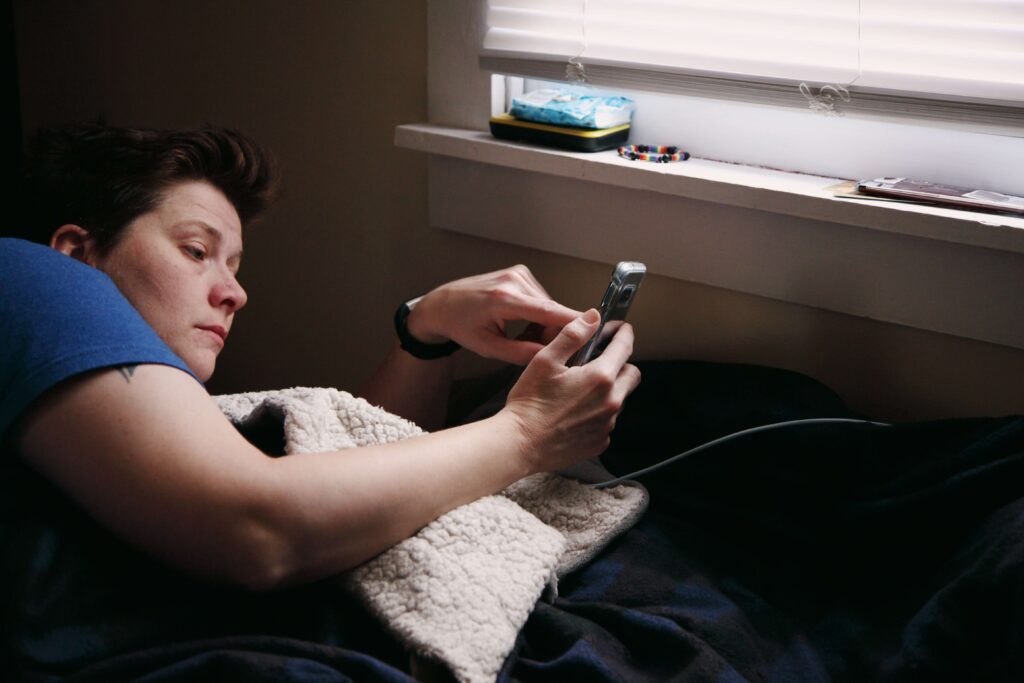
6 Social Media and Screen Time Techniques to Improve Your Mental Health
Set a Screen Time Goal:
An easy first step towards gaining control over social media use is setting a screen time goal. This means deciding on a specific amount of time that you will allow yourself to use social media each day. This could be 30 minutes, an hour, or any amount that you feel comfortable with. Setting this goal can help you maintain a balance between your digital life and real-world interactions.
Use Restrictions in Phone Settings:
Most smartphones have built-in features that can help you manage your screen time. You can set restrictions for specific apps, which means your phone will limit your access to these apps once you’ve reached your predetermined time. This not only helps enforce your screen time goals, but it can also make you more aware of your usage habits.
- How do I limit my screen time on an Apple device?
- How do I limit my screen time on an Android device?
Only Use Social Media On A Desktop Computer:

Another technique is to restrict your social media access to a desktop computer only. This eliminates the possibility of mindless scrolling on your phone throughout the day, as you’ll have to be more intentional about logging in.
Use Third-Party Apps:
There are numerous third-party apps designed to help you manage your screen time. Apps such as Qustodio, Bark, and Norton allow you to block distracting apps, schedule offline time, or even set up a distraction-free environment for a specific duration.
Talk to a Friend:
When you’re feeling the urge to use social media, try reaching out to a friend or family member instead. Engaging in a direct conversation with someone can be far more fulfilling and can also act as a healthy distraction from social media.
Seek Therapy:
If you’re finding it particularly challenging to control your social media usage, or if it’s causing significant stress or anxiety, it may be helpful to speak with a professional. Therapists can provide you with coping mechanisms, strategies for managing stress and anxiety, and help you work through any underlying issues that may be contributing to excessive social media use.
Imagine having the inside track on how social media affects your mental health – an understanding that could transform your experience online. This doesn’t mean you need to live like a hermit in a world increasingly dependent on digital connectivity. We’re not advocating for cutting off all digital interactions, rather, our goal is to empower you by revealing the influence such platforms have on your psychological health.
Understanding Social Media
Let’s start with a fun comparison. Social media can sometimes act like an unpredictable slot machine. One moment, you’re hit with a funny meme, the next, a cute cat video, then maybe some breaking news. This unpredictability triggers a rush of dopamine, our body’s feel-good hormone. But caution, dear friend! This quick fix for happiness can turn into a tricky loop, messing with our everyday tasks, productivity, and even causing a bit of restlessness when we’re not plugged into the social media matrix.

Now let’s talk about the validation game that’s so common on these platforms. Many of us, perhaps unknowingly, seek approval through likes, comments, and shares, tying our self-esteem to these virtual thumbs-ups. The downside? It can leave us feeling a bit down and alone, especially when we’re comparing our unfiltered lives to the highly polished versions seen on social media.
The Power of Mindfulness
Ever felt a twinge of FOMO – Fear of Missing Out? Seeing friends and folks partake in activities we’re not a part of can stir up feelings of being on the sidelines. This can lead us to check social media more often than necessary, causing distractions, putting off tasks, and boosting our stress levels.

So, you might be wondering, how does knowing all this help? Well, understanding these dynamics can change how we interact with social media. Firstly, being aware of the instant gratification trap can help us take charge of our time and attention, reducing anxiety and improving our focus on what’s truly important.
In the same way, recognizing the need for validation and comparison can steer us toward healthier self-esteem and self-perception. When we’re not constantly bombarded with seemingly perfect lives, we can better appreciate our own accomplishments and focus on self-improvement.
And guess what? Being mindful of the FOMO phenomenon can encourage more meaningful, engaging real-life interactions, fostering a stronger sense of belonging and reducing feelings of exclusion. Diving into direct interactions, hobbies, or activities can bring about a genuine sense of fulfillment, much more satisfying than fleeting online approval.
Taking Control

Social media, having carved out a significant chunk in our lives, isn’t something we can easily cast aside – and nor should we. It may seem overwhelming, the thought of curtailing the hours spent scrolling those feeds, but even the slightest modification can unfurl a ripple of positive impacts.
And do bear in mind, if the storm of anxiety or depression keeps battering, reaching out to professionals is always a sensible choice. They’re equipped to conduct proper screenings and prescribe the right treatments, forming a holistic approach to safeguarding mental health. Social media is an extraordinary resource, but its influence should not steer the course of our happiness or sense of self-worth.
So, rather than concluding, let’s consider this a new beginning. An embarkation point to understand social media from a different lens, inviting mindful interactions with every swipe and scroll. The adventure into a more conscious digital experience starts now!
